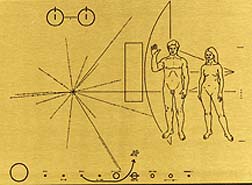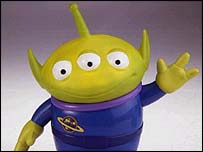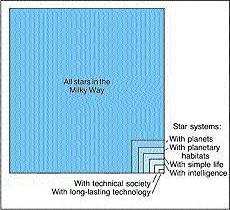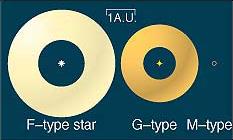 |
What about
Communications and Contact?
- Detecting signals – SETI: Some
radio telescopes are listening (What was the 1977 "Wow!"
signal?); Our best bet is around 18-21 cm waves; Project Phoenix
was ended without a signal, but there are other searches; An
optical SETI telescope has started operating at Harvard, looking
for brief flashes of light.
- How can we reach out? Interstellar
travel? Takes far too long. Send out probes? Already done (Pioneer
10, Voyager); Send radio waves? In 1974 we broadcast a radio
message to space, and we're waiting; Also, we may be contributing
to future life elsewhere by leaking out our own, panspermia-style.
- Contact? No real evidence yet
of extraterrestrial presence on Earth (despite some relatively
widespread beliefs).
|
|
 Summary:
SETI could succeed tomorrow, or it may be an endeavor for multiple
generations: We are a very young technology in a very old galaxy;
Our own leakage radiation outshines the Sun at many frequencies,
and we are detectable to others; When our use of the spectrum
becomes more efficient, it will be time to consider deliberate
transmissions and the really tough questions: Who will speak
for Earth? What will they say? Summary:
SETI could succeed tomorrow, or it may be an endeavor for multiple
generations: We are a very young technology in a very old galaxy;
Our own leakage radiation outshines the Sun at many frequencies,
and we are detectable to others; When our use of the spectrum
becomes more efficient, it will be time to consider deliberate
transmissions and the really tough questions: Who will speak
for Earth? What will they say?
So far, though, the conclusion is: "We live in a quiet
neighborhood" (Peter Backus, Seti Institute).
|








![]()